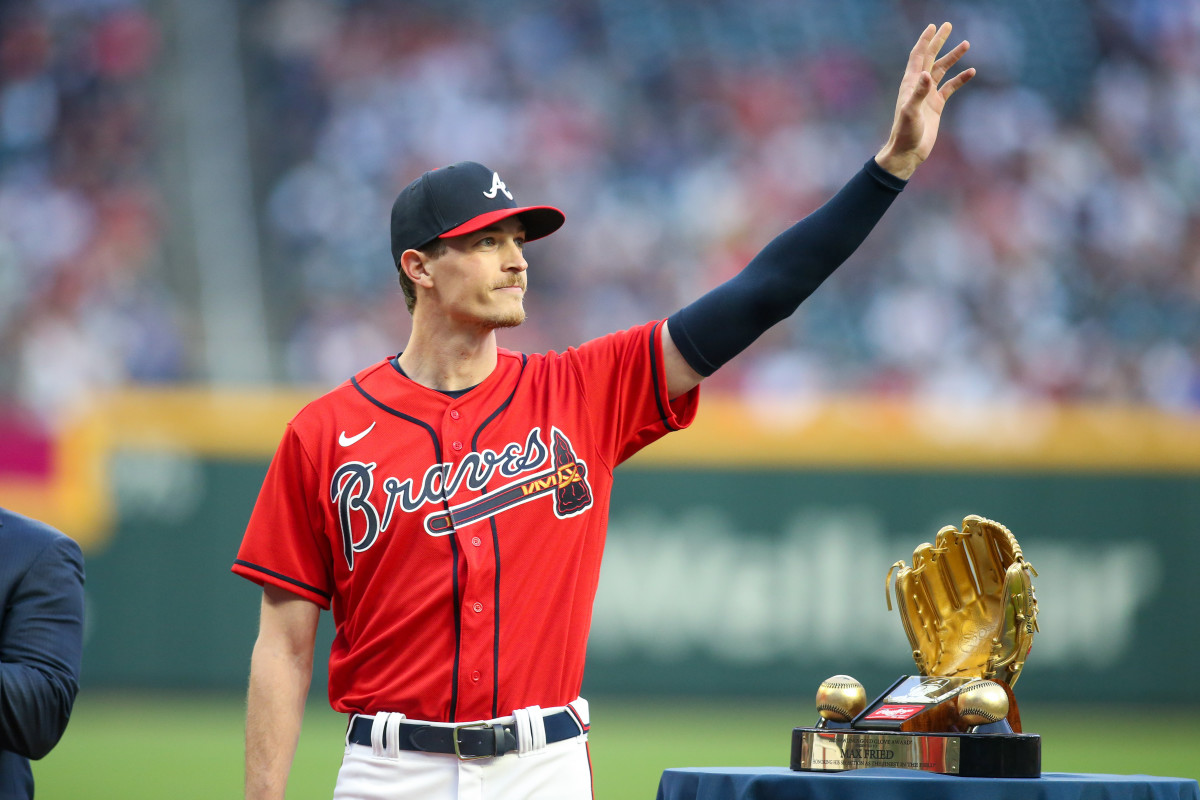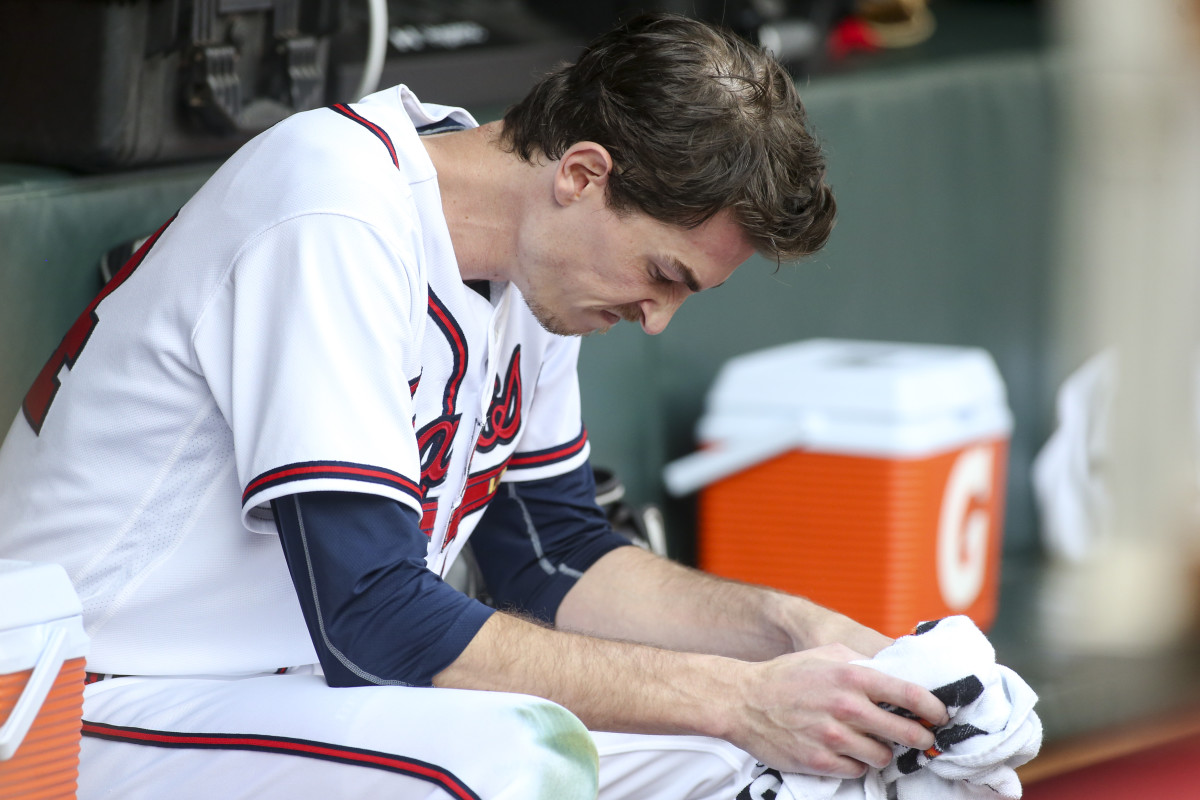What are the odds that Atlanta signs Max Fried to a long-term extension?
When looking over the Braves long-term deals, it's really exciting to see all of the talent signed long-term - your entire infield is signed for at least three more years (Orlando Arcia), with Matt Olson, Austin Riley, and Sean Murphy being around through at least 2027. Two of your three outfielders are on long-term deals (Michael Harris II and Ronald Acuña Jr, as is starter Spencer Strider.
But there's one glaring exception to the contractual control that stretches all across the Braves roster: Max Fried.
The 2022 NL Cy Young runner-up is in his next to final year of team control, making $13.5M dollars on an ARB-3 deal and facing the prospect of one final year of arbitration before hitting unrestricted free agency before the 2025 season.
What are the chances that Atlanta signs Max Fried to a long-term extension?
Unfortunately, I don't think it's very good, for a few reasons.
Fried's out of the typical Braves timeline for a long-term extension

The first problem with trying to sign Max Fried to a long-term extension is the Braves don't really have any leverage here to get the deal done at any sort of discount.
You see, signing a long-term extension early in your career is about allocation of risk between the player and the team.
Let's use Spencer Strider as an example:
Spencer Strider signed a contract extension during his first full season in Atlanta, agreeing to a six-year, $75M deal. He signed the deal on October 10th, 2022, right after he had clicked over into one full year of service time.
The idea there, for Strider, was rather than two years of league minimum salaries and three years of arbitration, he accepted less money to have a fully guaranteed deal that covered all of those years plus one of his free agent years. Here's how the annual salary breaks down.
Year | Age | Non-extension status | Non-extension salary | Extension salary |
|---|---|---|---|---|
2023 | 24 | Pre-Arbitration | $700,000 | $1M |
2024 | 25 | Pre-Arbitration | $720,000 | $1M |
2025 | 26 | Arbitration 1 | ? | $4M |
2026 | 27 | Arbitration 2 | ? | $20M |
2027 | 28 | Arbitration 3 | ? | $22M |
2028 | 29 | Unrestricted Free Agent | ? | $22M |
2029 | 30 | ? | $22M (Club Option) | |
2030 | 31 | Unrestricted Free Agent |
So, Strider's salary is more than the minimum he would have earned during his pre-arbitration days, and is a healthy $20M salary for his arbitration period before increasing to $22M for his free agent years.
By comparison, here's what some top pitchers got last year in arbitration:
Corbin Burnes (Arb 3): $12.7M
Max Fried (Arb 3): $12.1M
Julio Urias (Arb 4): $14.25
It's easy to see that Strider's extension locked him into higher paydays during his arbitration years and gave him some security were he to get injured and not be able to pitch in return for sacrificing up to two years of higher free agency earnings.
But that's not where Max Fried is, career-wise.
Max Fried's gone through the arbitration process three times, signing one year deals each time. He's had no long-term security, rather assuming the risk himself by being on a one-year deal every season since he debuted in Atlanta back in 2017.
It's a lot harder to get a discount on the cost of the contract where there's a lot less risk to transfer from the player to the club.
The money probably isn't going to line up unless something changes

So if there's not a significant discount to be had here, can Atlanta afford to sign him to a market-rate extension?
This is where it gets tricky.
Every single extension Atlanta's signed for their core does not exceed $22M in any year of the deal.
Every single one.
Not Spencer Strider, not Matt Olson, not Austin Riley, not Sean Murphy, not Ronald Acuña Jr, not Ozzie Albies, not Michael Harris II, not Orlando Arcia.
It's obvious that $22M/year is the highest that Alex Anthopoulos has been willing to go to up to this point.
And what does every high-profile free agent that Atlanta's seen walk - namely Freddie Freeman and Dansby Swanson - have in common? They all signed for more than $22M AAV (Annual Average Value). Dansby's averaging $25.3M on his seven-year, $177M contract with the Cubs that'll take him through his age 35 season. Freddie's earning a base salary of $27M on his six-year, $162M contract with the Dodgers that'll take him through his age 37 season (although with the deferred money in the deal, something Atlanta's reportedly not interested in doing, Freddie's "only" taking home roughly $17.5M a year in actual cash over the life of the deal, as he's got $57M deferred from 2028-2040).
And the odds that Max Fried could get more than $22M on the open market are pretty high. In last year's free agency, Justin Verlander got $43.3M, although that was a short (two-year) deal. Jacob DeGrom got $37M AAV across five years. Carlos Rodon got $27M across six years.
Going back to the previous free agency, six pitchers met or exceeded $22M a year, with Kevin Gausman and Robbie Ray both getting that exact number on five year deals and Marcus Stroman, Justin Verlander, and Max Scherzer all beating it on multiple-year deals (albeit with opt outs on the part of both Stroman and Verlander).
His injury issues this season aren't going to bring the price down, but his postseason success and last year's Cy Young runner-up status will definitely bring the price UP.
Multiple off the field factors combine to make it unlikely

There's also some other, non-baseball factors that are stacked against Atlanta in getting a discount to sign Fried.
The first, and one that comes up the most, is he doesn't fit the profile of most (but not all) of Atlanta's long-term extensions: growing up in Braves Country, dreaming of playing for the Braves.
Austin Riley's from Mississippi. Matt Olson's from Atlanta, as is Michael Harris II. Spencer Strider was born in Ohio, but grew up in Tennessee and went to college in South Carolina.
Even Ozzie Albies has a Braves connection from his childhood - he's from Curaçao, where he's talked about growing up and hearing about legendary native son Andruw Jones patrol outfields for the Atlanta Braves.
Max Fried, by comparison, was born in Santa Monica, CA and went to legendary Harvard-Westlake High School in Los Angeles before being drafted by the San Diego Padres in 2012.
Believe it or not, that stuff matters. It obviously did to Freddie Freeman.
Additionally, Max Fried is the union's player rep for the Atlanta Braves. Anecdotally, those players that are willing to invest their time and energy into working with the MLBPA on collective bargaining and labor relations issues understand better than most not only the empowerment that comes with becoming a free agent, but the precedent that the contract you sign could set for future free agents.
Those guys tend to at least make it to free agency, even if they end up re-signing with their current team. And they don't typically take significant financial discounts to sign, either.
So, does Atlanta re-sign Max Fried or not?
Nothing's saying that Atlanta hasn't tried to re-sign Max Fried already, for the record. Just because a deal hasn't been done doesn't mean that the front office hasn't offered one, just that Max hasn't accepted it. This front office, more so than any other front office in Major League Baseball, has absolutely zero leaks or advance notice of moves being made before they're announced by the team. If Max was offered a deal and declined it, we'd never know unless either the team or player volunteered that information.
As far as it happening between now and the end of the 2024 season: I'm not saying no, but it feels unlikely. The only way Alex Anthopoulos will be able to keep Max Fried on a long-term deal is to come up from that $22M AAV figure. It's unknown if that's an unbreakable rule to this point in time, or just a matter of preference that he'd like to try and avoid.
We've seen Atlanta make certain personnel decisions this season with the objective of having pitchers around for future seasons, with Michael Soroka's service time being the most obvious example of this. And Alex Anthopoulos has been outspoken about wanting two aces at the top of his rotation, so maybe he decided Max Fried is worth going past his $22M/yr limit to make it happen rather than banking on a return to form from Soroka or development of a prospect like a AJ Smith-Shawver or Hurston Waldrep.
But it's hard to see a Max Fried long-term deal happening from here.
Check out Braves Today on Socials!
Follow Braves Today on Twitter!
Like Braves Today on Facebook!
Check out the homepage for more Atlanta Braves News!
Subscribe to Braves Today on YouTube!
Get Exclusive Braves Merchandise from FOCO
